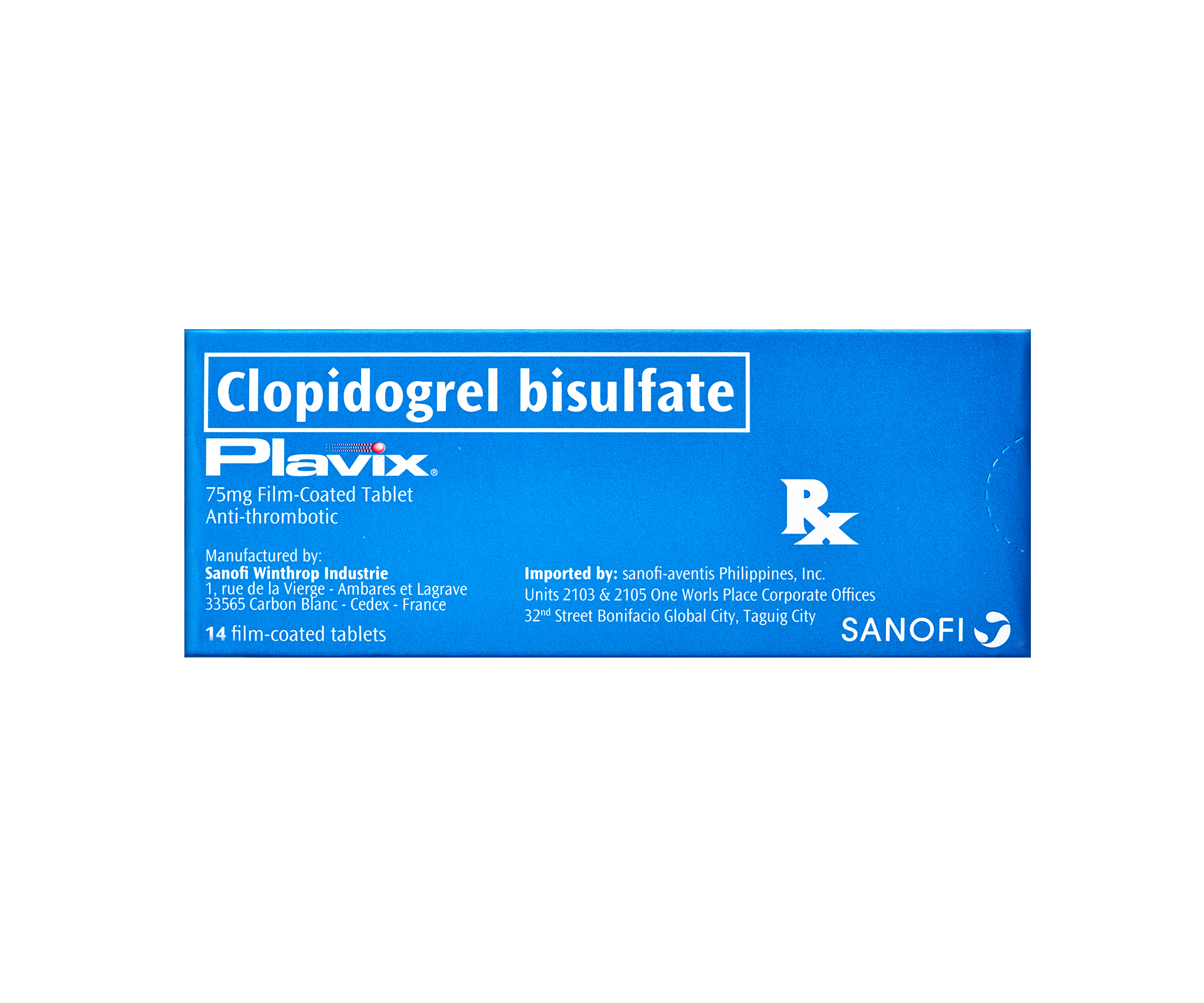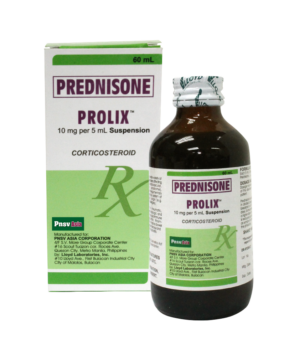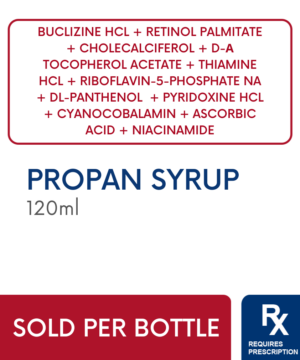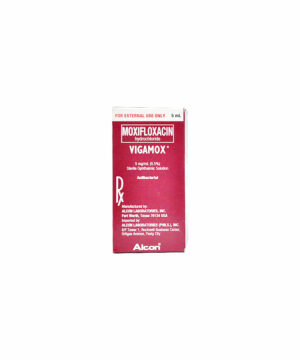Description
PLAVIX 75MG TABLET
Indications / Uses :
Prevention of atherothrombotic events in: Recent MI, Recent Stroke or Established Peripheral Arterial Disease: For patients with a history of recent myocardial infarction (MI), recent stroke, or established peripheral arterial disease, Plavix has been shown to reduce the rate of a combined endpoint of new ischemic stroke (fatal or not), new MI (fatal or not), and other vascular death.
Acute Coronary Syndrome: For patients with non-ST-segment elevation acute coronary syndrome (unstable angina/non-Q-wave MI) including patients who are to be managed medically and those who are to be managed with percutaneous coronary intervention (with or without stent) or coronary artery bypass graft (CABG), Plavix has been shown to decrease the rate of a combined endpoint of cardiovascular death, MI or stroke as well as the rate of a combined endpoint of cardiovascular death, MI, stroke or refractory ischemia.
For patients with ST-segment elevation acute MI, Plavix has been shown to reduce the rate of death from any cause and the rate of a combined endpoint of death, reinfarction or stroke.
Atrial Fibrillation: In patients with atrial fibrillation (AF) at increased risk of vascular events who can take vitamin K antagonist (VKA) therapy, VKA has been shown to be associated with a better clinical benefit than acetylsalicylic acid (aspirin) alone or the combination of clopidogrel and aspirin for the reduction of stroke.
In patients with atrial fibrillation who have at least 1 risk factor for vascular events and who cannot take VKA therapy [eg, specific risk of bleeding, physician assessment that patient is unable to comply with international normalized ratio (INR) monitoring or that VKA use is inappropriate], clopidogrel is indicated in combination with aspirin for the prevention of atherothrombotic and thromboembolic events, including stroke. Clopidogrel in combination with aspirin has been shown to reduce the rate of the combined endpoint of stroke, myocardial infarction (MI), non-CNS systemic embolism, or vascular death, largely through a reduction in stroke (see Pharmacology: Pharmacodynamics: Clinical Efficacy under Actions).
Administration :
May be taken with or without food.
Contraindications :
Hypersensitivity to clopidogrel or any component of Plavix.
Active pathological bleeding eg, peptic ulcer or intracranial hemorrhage.
Special Precautions :
Bleeding and Hematological Disorders: Due to the risk of bleeding and hematological undesirable effects, blood cell count determination and/or other appropriate testing should be promptly considered whenever such suspected clinical symptoms arise during the course of treatment (see Adverse Reactions). Because of the increased risk of bleeding, the concomitant administration of warfarin with Plavix should be undertaken with caution.
As with other antiplatelet agents, Plavix should be used with caution in patients who may be at risk of increased bleeding from trauma, surgery or other pathological conditions, and in patients receiving treatment with acetylsalicylic acid, heparin, glycoprotein IIb/IIIa inhibitors, non-steroidal anti-inflammatory drugs (NSAIDs) or selective serotonin reuptake inhibitors (SSRIs).
If a patient is to undergo elective surgery and an antiplatelet effect is not desired, Plavix should be discontinued 5-7 days prior to surgery.
Plavix prolongs bleeding time and should be used with caution in patients who have lesions with a propensity to bleed (particularly gastrointestinal and intraocular). Drugs that might induce gastrointestinal lesions (eg, acetylsalicylic acid and NSAIDs) should be used with caution in patients taking Plavix.
Patients should be told that it may take longer than usual to stop bleeding when they take clopidogrel alone or in combination with aspirin, and that they should report any unusual bleeding (site or duration) to their physician. Patients should inform physicians and dentists that they are taking Plavix before any surgery is scheduled and before any new drug is taken.
Recent Ischemic Stroke: In patients with recent transient ischemic attack or stroke who are at high risk of recurrent ischemic events, the combination of aspirin and clopidogrel has been shown to increase major bleeding. Therefore, such addition should be undertaken with caution outside of clinical situations where the combination has proven to be beneficial.
Thrombotic Thrombocytopenic Purpura (TTP): Thrombotic thrombocytopenic purpura (TTP) has been reported very rarely following the use of Plavix, sometimes after a short exposure. It is characterized by thrombocytopenia and microangiopathic hemolytic anemia associated with either neurological findings, renal dysfunction or fever. Thrombotic thrombocytopenic purpura is a potentially fatal condition requiring prompt treatment, including plasmapheresis (plasma exchange).
Acquired Haemophilia: Acquired haemophilia has been reported following use of clopidogrel. In cases of confirmed isolated activated Partial Thromboplastin Time (aPTT) prolongation with or without bleeding, acquired haemophilia should be considered. Patients with a confirmed diagnosis of acquired haemophilia should be managed and treated by specialists, and clopidogrel should be discontinued.
Cytochrome P450 2C19 (CYP2C19): Pharmacogenetics: In patients who are CYP2C19 poor metabolizers, Plavix at recommended doses forms less of the active metabolite of Plavix and has a smaller effect on platelet function.
Poor metabolizers with acute coronary syndrome or undergoing percutaneous coronary intervention treated with Plavix at recommended doses may exhibit higher cardiovascular event rates than do patients with normal CYP2C19 function (see Pharmacology: Pharmacokinetics: Pharmacogenetics under Actions).
Tests are available to identify a patient’s CYP2C19 genotype; these tests can be used as an aid in determining therapeutic strategy. Consider the use of higher clopidogrel doses in patients who are known CYP2C19 poor metabolizers (see Pharmacokinetics: Pharmacogenetics under Actions).
Cross-Reactivity among Thienopyridines: Patients should be evaluated for history of hypersensitivity to another thienopyridine (eg, ticlopidine, prasugrel) since cross-reactivity among thienopyridines has been reported (see Adverse Reactions).
Thienopyridines may cause mild to severe allergic reactions such as rash, angioedema, or haematological reactions such as thrombocytopaenia and neutropaenia. Patients who had developed a previous allergic reaction and/or haematological reaction to one thienopyridine may have an increased risk of developing the same or another reaction to another thienopyridine.
Monitoring for cross-reactivity is advised.
Renal Impairment: Experience with Plavix is limited in patients with severe renal impairment. Therefore, Plavix should be used with caution in this population.
Hepatic Impairment: Experience is limited in patients with severe hepatic disease who may have bleeding diatheses. Plavix should therefore be used with caution in this population.
Excipients: Patients with rare hereditary problems of galactose intolerance, the Lapp-lactase deficiency or glucose-galactose malabsorption should not take Plavix.
Effects on the Ability to Drive or Operate Machinery: No impairment of driving or psychometric performance was observed following clopidogrel administration.













Reviews
There are no reviews yet.